Unique and forgotten: the birth of the Soviet missile defense system. Czech Republic comes into play
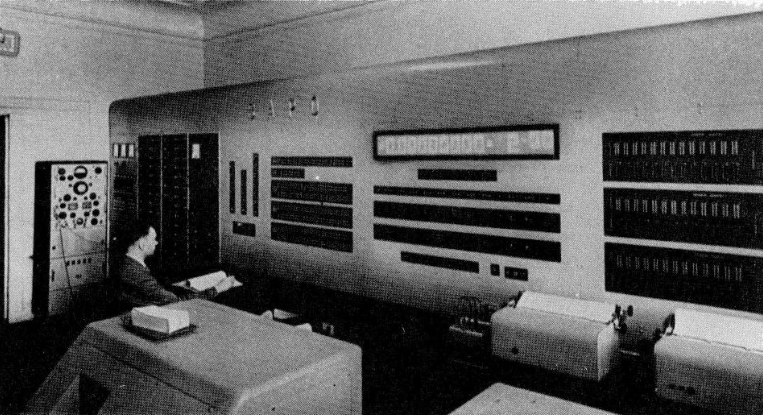
Engineer Freedom
History the life of the engineer Svoboda is drawn to a small adventure novel and is little covered in Russian literature.
He was born in Prague in 1907 and survived the First World War. Wandered around Europe, fleeing the Nazis. He returned to Czechoslovakia, already Soviet. And in the end he was forced to flee again, already fleeing from communism.
Since childhood, Svoboda was fond of technology and entered the famous Czech Technical University in Prague (Česke vysoke učeni technicke v Praze, ČVUT) (more precisely, the mechanical and electrical college with him). The Czech Polytechnic, in general, is known for the fact that they have always treated all kinds of innovations with great respect. It was there that in 1964 the Department of Computer Science was opened - one of the oldest in Europe and the world. On September 1964, XNUMX, a new discipline appeared in the schedule - "technical cybernetics", in fact - computer design (for the first time among the Warsaw Pact countries).
Subsequently, the department developed programming systems and compilers in the languages Algol-60 and Fortran. Many of them were first implemented in Eastern Europe and the USSR exactly there and became standard. By 1974, the Czechoslovakian mainframe Tesla 200 was installed at the department (Tesla, named not after the famous insane electrical engineer, but as an acronym for technika slaboprouda - low-voltage technologies, was one of the most famous in Eastern Europe and, in addition to mainframes, produced a huge amount of equipment : from microprocessors - Intel clones to PCs).
By 1989, the department already had 72 employees who conducted 29 accredited courses on the following topics: compilers and programming languages; artificial Intelligence; computer graphics; computer networks; automation of circuitry, etc., which fully corresponded to the best world standards.
In general, computer education in Czechoslovakia was orders of magnitude higher in quality than the Soviet one. For example, already in 1962 in Czechoslovakia, courses for secondary school students in programming appeared (in our country this only appeared in the mid-80s). A year later, in parallel, one-year courses appeared for those who had already graduated from school.
However, before that in 1931 (when Svoboda graduated from college) it was still far away, although advanced developments were already underway there. This allowed him to continue his studies in England and return to his homeland and work in the field of X-ray spectroscopy and X-ray astronomy.
With the approach of war, Svoboda decided to apply his knowledge to develop anti-aircraft sights that could adjust the fire of a gun automatically, which he succeeded in. However, the international community decided to appease Hitler by allowing him to occupy Czechoslovakia. And in 1939, the engineer fled to France, not wanting his designs to go to the Nazis.
As we know, Czechoslovakia was not enough for Hitler. And France was next, falling a year later. While in Paris, Svoboda was working on sketches of his ballistic computer with a friend, physicist Vladimir Vand, also a Czech fugitive. Together they completed the development of the first analog air defense computer.
The Wehrmacht steadily advanced, and the friends had to run on. Regular transport no longer ran, they rode bicycles, trying to get ahead of the German offensive. On the way, one of the two sons of Liberty died, whom his wife Miluna gave birth to in Paris. After driving several hundred miles through war-torn France, they reached Marseilles, from where they were to be evacuated on a British destroyer. This plan fell through due to a misunderstanding between the British and French authorities overseeing the evacuation.
And Svoboda had to spend several months in the port, hiding from the Gestapo agents and trying to find a way to escape. In the end, Wand managed to get to England. And Miluna and her child achieved a move to the United States through Lisbon with the help of an American charity.
Unfortunately, the captain of the ship, to save space (there were thousands of refugees), threw away the personal belongings of passengers, including the Freedom bike, where he hid the blueprints of his calculator from the Germans. Svoboda himself made his way to the United States via Casablanca with the help of a local store manager at the Czech shoe factory Bata.
After a year of trials and tribulations, the unfortunate engineer finally arrived in New York, where, reunited with his family, in 1941 he took a job at the Radiation Laboratory at MIT. There he refined his fire control system, which turned into an air defense computer for fleet Mark 56, which significantly reduced the amount of damage from Japanese aircraft in the final stages of the war.
For his developments, he received an award - the Naval Ordnance Development Award. In Boston, he worked and communicated with almost all the pioneers of computer technology - the great John von Neumann, Vannevar Bush and Claude Shannon.
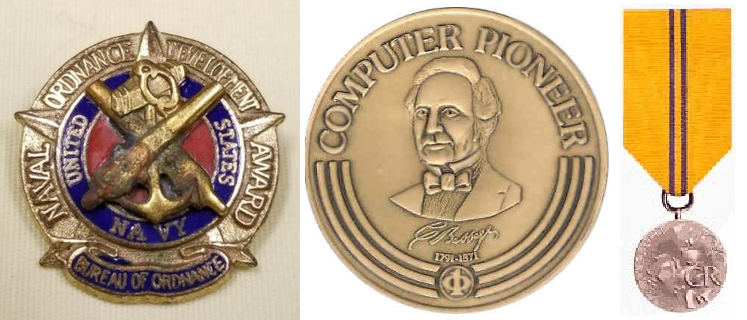
Antonin Svoboda awards, of which only one lifetime, from left to right - Naval Ordnance Development Award, IEEE Computer Pioneer Award (an approximate analogue of Nobel in computer science) and Medaile Za zásluhy I stupeň
Svoboda was, however, distressed by his work for the military. He wanted to do something more peaceful and design ordinary computers.
So after the war he returned to Prague in 1946, hoping to start lecturing and researching at his hometown CTU. Unfortunately, at home he received a very cool welcome. The professors of the Soviet Czech Republic felt in him a dangerous competitor.
Further intrigue and struggle was very similar to what happened with the best designers in the USSR. Svoboda first published his monograph, Computing Mechanisms and Linkages, based on his work at MIT. It was the world's first book entirely devoted to computing architecture. Later it became a classic. And has been translated into English, Chinese, Russian and many other languages.
However, when Svoboda offered his work as a dissertation for the title of associate professor, he was refused, with the comment "this is not enough." Instead of Freedom, the chair of mathematics was headed by a member of the communist party Václav Pleskot.
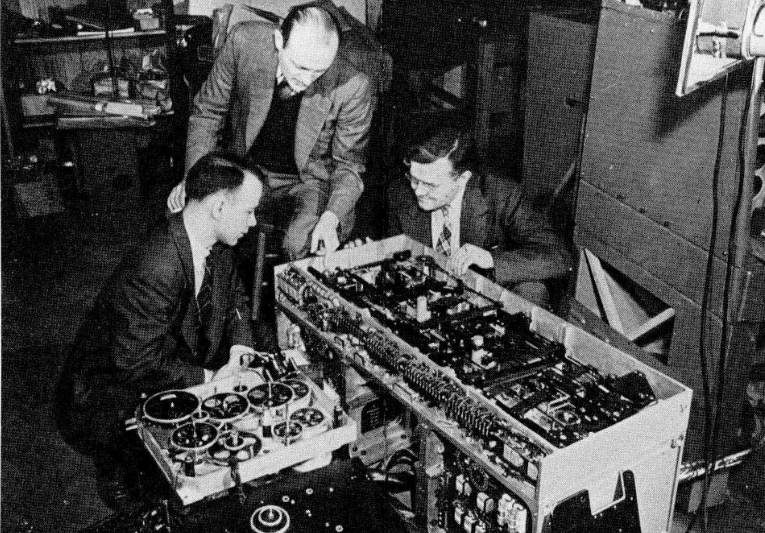
Antonin Svoboda (right), Robert L. Kenngott, and Carl W. Miller assemble the Mark 56 targeting computer, Radiation Laboratory, MIT (Photo by Jan G. Oblonsky, IEEE Annals of the History of Computing Vol. 2, No. 4 October 1980)
Svoboda found support from Václav Hruška, author of a collection on numerical mathematics. And with his help, in 1947, together with Zdeněk Trnka, he was able to receive a grant from the United Nations Relief and Rehabilitation Administration (UNRRA).
This donor organization was created in 1943 to provide assistance in areas liberated from the Axis powers. A total of about $ 4 billion was spent on the supply of food and medicine, the restoration of utilities, agriculture and industry in China, Eastern Europe and the USSR.
This grant allowed Svoboda to go to the West for a year and study advanced computer design methods. There he closely interacted with Alan Turing, Howard Aiken, Maurice Wilkes, and other legendary founders of computer science.
Returning in 1948, he began lecturing "Information Processing Machines" at CTU's Electrical Engineering Department, just for everyone to listen to, outside of the curriculum. In order not to starve to death, he got a job in the Prague branch of the famous armory company Zbrojovka Brno, which produced punched cards. At this place, he organized a laboratory and developed a series of prototypes of electromechanical calculators from a desktop calculator on electromagnetic relays to an advanced tabulator with memory of commands and constants.
The firm was not interested in younger models. But by 1955 (by that time renamed Aritma), a relay computer of its design began to be produced under the designation T-50. For this work, Svoboda was awarded the Klement Gottwald State Prize of Czechoslovakia in 1953. And she remained his only Czech lifetime award.
- wrote his colleague Václav Černý.
In 1950, Professor Eduard Čech, director of the newly created Central Institute for Mathematical Research, drew attention to the plight of Liberty and offered him a job. So, Svoboda was able to start developing his first computer - SAPO, the features of which we will talk about below.
VUMS
However, in his new place, ill-wishers from the Czech Communist Party appeared. Former classmate Jaroslav Kozesnik, when he became director of the Institute of Information Theory and Automation of the Academy of Sciences of Czechoslovakia, considered him an unpleasant competitor, mainly thanks to the award that Svoboda had received earlier. The Kozheshnik tried in every possible way to put pressure on him along the party line and destroy him with the help of communist officials.
But Svoboda wanted to avoid direct confrontation. He made sure that his organization was transferred from the Academy under the wing of the Ministry of General Engineering as the Research Institute for Mathematical Machines (VUMS). Starting with three scientists - Svoboda, Cerny and Marek and two of their students - by 1964, VUMS became one of the foremost centers of informatics in Europe, which already included more than 30 doctors of sciences and 900 employees, published its own journal, held international conferences and developed computers world class.
He began his work at VUMS Svoboda with the construction of a special relay machine M 1 - at the request of the Institute of Physics in Prague, having completed it by 1952.
M 1 used the world's first conveyor unit, invented by Svoboda, implemented on a relay (!), Designed to calculate one cumbersome expression of mathematical physics. Moreover, the design was unique in that the entire expression was calculated, thanks to the combination of operations, in one switching cycle.
However, relay machines had many drawbacks (and it was almost impossible to get lamps in the Czech Republic plundered by the Nazis at that time), in particular, low reliability and constant erroneous operations. As a result, Svoboda decided in his next project to bypass this problem by developing for the first time in the world a unique architecture of a fault-tolerant computer (later these principles were massively used in Soviet military machines).
SAPO
Svoboda was the first to suggest that a machine might be able, with the help of special circuitry, not only to perform calculations, but also to monitor its condition and automatically correct errors arising from component failure. As a result, the SAPO computer (from Czech. Samočinny počitač - "automatic calculator") was assembled on a wretched element base, only available then to the Czechs. But its architecture was very advanced compared to Western designs.
The machine had 3 independent ALUs working in parallel (also for the first time in the world), three magnetic drums for recording results with parity to check read operations from memory and two independent majority blocks, also assembled on relays, checking the identity of all operations.
If one of the blocks produced a result different from the work of the others, voting took place and the result of the work of the other two blocks was accepted, and the faulty one was detected and replaced without losing data. The operator received a critical error notification only when all three independently obtained results did not match. Moreover, the machine could be restarted with just one instruction, without losing the previous steps of calculations.
The SAPO consisted of 7000 relays, 380 lamps and 150 diodes and had a highly advanced programming scheme with multicast commands.
Later, after the second emigration to the United States, Svoboda brought with him knowledge about the creation of such a class of machines - in the 1960s this task became highly relevant, the military needed reliable computers to control missile defense systems, to control especially dangerous objects, such as nuclear power plants, for the project Apollo and the space race.
According to this principle, JSTAR was developed - the Voyager computer, the on-board computer of the Saturn V rocket, the CADC processor of the F-14 fighter and many other computers. Fault-tolerant systems were actively developed by IBM, Sperry UNIVAC and General Electric.
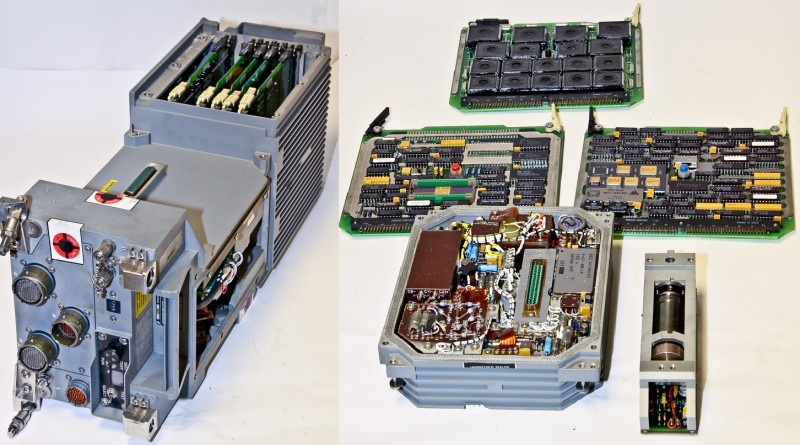
F-14 fighter board computer assembly (left) and its design (right) (photo courtesy of the private museum of military electronics Glenn's Computer Museum)
The design of the SAPO was started in 1950 and completed in 1951.
But due to the deplorable financial situation of Czechoslovakia after the war, the actual implementation was possible only after a few years. It was put into operation at the end of 1957 (in general, the war affected Czechoslovakia almost worse than the USSR - until 1940 it was one of the 10 most industrialized countries in the world, after the 45th it was thrown almost to the end list).
Svoboda continued to work on further improving its designs.
But over time, Czechoslovakia felt the burden of joining the Soviet bloc more and more. Party officials restricted his work and access to the computers he helped design. And, ultimately, in his own office, Svoboda was met by an officer of StB (Státní bezpečnost, the Czech equivalent of the KGB), who ordered him to report on all his decisions and activities.
The problem was both his "suspicious" background (working at MIT) and his liberal thinking. In 1957, Svoboda gave a course of lectures on logical computer design at the Chinese Academy of Sciences in Beijing. He gave such lectures in Moscow, Kiev, Dresden, Krakow, Warsaw and Bucharest. But his visits to Western countries were severely limited.
He managed to speak at conferences in Darmstadt (in 1956, SAPO was presented there and highly appreciated by Howard Aiken himself), Madrid (1958), Namur (1958). But he was not admitted by the Czechoslovak authorities to Cambridge (1959) and many other Western conferences. In 1963, Svoboda was not allowed to accept an invitation to head the Department of Applied Mathematics at the University of Grenoble.
After the death of his friend Cech in 1960, the leadership of the Academy of Sciences changed. VUMS was expelled from the Academy, and Svoboda was released from the leadership of the institute. This was the last straw.
His wife was able to leave for Yugoslavia. At that time, he himself, together with his son, was able to secure a trip to neutral Switzerland, where he immediately turned to the American consulate and asked for asylum. Several of the best employees of his institute also fled with him. The wife was able to move from Yugoslavia to Greece at this time. And she left for the USA from there.
At first, the consulate did not really understand who this person was. And they were not happy to see him. And it was here that his award, received earlier, came in handy. It is worth noting that due to the persecutions, Czechoslovakia lost many talented scientists who did not want to return to Czechoslovakia after the war or who fled from it to the West. Mathematician Václav Hlavatý, who worked with Albert Einstein on the basic equations of the Unified Field Theory. Ivo Babuška, one of the most prominent computational mathematicians in the world. Computer linguist Bedřich Jelínek, who was the first to teach machines to understand the human voice. And many others.
Freedom received a visa. And his acquaintance with respected and famous scientists and their guarantees helped him get a job at Caltech. Where he spent the last years of his life teaching computer architecture and stability theory and developing new mathematical models to ensure the smooth operation of computer systems, as he always dreamed of.
Unfortunately, his hard life cost him his health. And in 1977 he suffered a heart attack, after which he retired. Three years later, in 1980, Professor Svoboda died in Portland, Oregon, from cardiac arrest.
In 1999, the last president of Czechoslovakia, Vaclav Havel, posthumously awarded him the 1st Class Medal of Merit, in recognition of his work and talent.
Freedom, despite the fact that he is much less known in our country than Turing or von Neumann, was one of the most influential computer scientists of the XNUMXth century. His vision and influence has been felt in projects ranging from the Apollo computer to the CIWS Phalanx fire control system. His relentless resistance to totalitarianism inspired many Czech fugitives and independence fighters.
In addition, Svoboda was gifted in many ways, he played the piano perfectly, conducted the choir and played the timpani at the Czech Philharmonic. He was a brilliant player in bridge, one of the most difficult card games, and analyzed its strategies mathematically, with the publication of The New Theory of Bridge. Despite his early work on military technology, he was a consistent anti-militarist and anti-totalitarian, an honest and courageous person who never hid his views, even when it cost him persecution and a career in his home country.
In 1996, together with many other scientists and engineers of the Eastern Bloc, whose achievements for the time being remained unknown in the world (including S. A. Lebedev, V. M. Glushkov, A. A. Lyapunov, as well as Hungarians Laszlo Kozma and Laszlo Kalmar, Bulgarians Lubomir Georgiev Iliev and Angel Angelov, Romanian Grigore Konstantin Moisil, Estonian Arnold Reitsakas, Slovaks Ivan Plander and Josef Gruska, Czechs Anthony Kilinsky and Jiri Horzheysh and Pole Romuald Marcishelova awarded the number of computers awarded to the military Computer Pioneer Award), recognizing those without whom the development of computer science would be impossible.
Barr and Sarant
It is impossible not to recall and perhaps the most amazing collision that occurred in the life of Svoboda back in the 1950s.
During his work on SAPO, he (as an expert in anti-aircraft computers) was simultaneously involved in work on a Czech ballistic computer as part of a group led by two amazing personalities - a certain Joseph Veniaminovich Berg and Philip Georgievich Staros, who flew from Moscow to help the fraternal republic. But no one knew that they were in fact Joel Barr and Alfred Epamenondas Sarant, rare birds that flew in the opposite direction, communists and defectors to the Soviet bloc from the United States. Their history, amazing adventures in the USSR, the role in the creation of domestic microelectronics (or, the lack of such, again, battles in this topic for more than one article) deserve a very separate consideration.
Here we, just so that the reader appreciates how ironic fate is sometimes, will give a short beginning of their creative path.
Barr and Sarant were children of immigrants, bachelors of electrical engineering (one graduated from the City College of New York, the other from the Albert Nerken School of Engineering, Cooper Union College, ibid.). Both are members of the US Communist Party. Barr worked as an engineer at the Signal Corps Laboratory, later at Western Electric, and most importantly at Sperry Gyroscope, in those years one of the most closed military corporations in America. Sarant's career was much the same: Signal Corps, Western Electric, then the equally famous and no less military AT&T Bell Labs. Ever since college, through membership in the Communist Party, they were familiar with a well-known person - Julius Rosenberg, the main Soviet nuclear (and not only) spy.
In 1941, Rosenberg recruited Bar. Barr recruited Sarant in 1944. Members of the Rosenberg group were interested not only in nuclear weapons, many worked in radio-electronic defense firms (it was Sperry and Bell that were especially valuable). In total, they handed over to the USSR about 32000 pages of documents (Barr and Sarant stole about a third of this). In particular, they stole a sample of a radio fuse, blueprints for the SCR-517 aircraft radar and the SCR-720 ground radar, information on the Lockheed F-80 Shooting Star and B-29 aircraft, data on the night bomber sight, and much more. By 1950, the group had failed, with everyone arrested except the escaped Barra and Saranta.
Let's omit the details of their adventures on the way to the USSR. We only note that in the summer of 1950, I.V. Berg appeared in Moscow, and a little later, FG Staros. With new biographies, they were sent to Prague to the Military Technical Institute. Berg recalled it this way:
It cannot be said that Staros and Berg were outstanding designers (they, of course, saw the sights, but they had nothing to do with their development). But they turned out to be first-class organizers and capable students. And first of all, they asked for help in the person of a person whom they had known since the times of the United States - an expert on targeting computers Antonin Svoboda. This is how the fates of people are sometimes intertwined in a bizarre way.
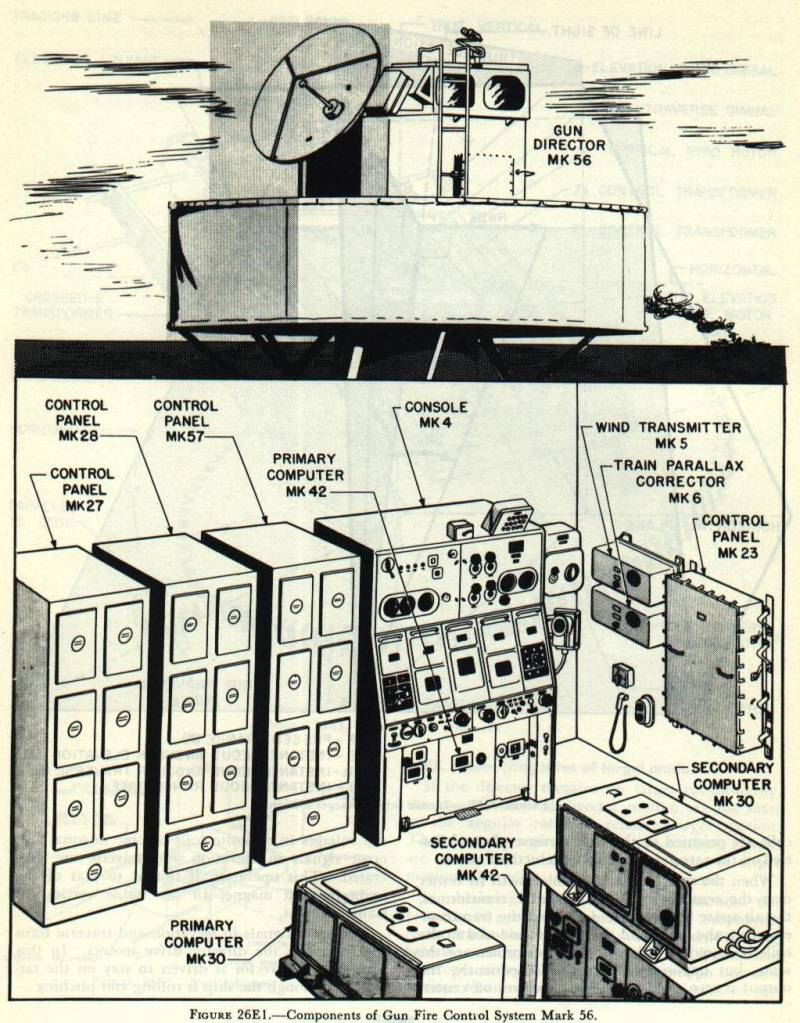
The same Mark 56, the analogue of which was built by Staros and Berg, photo from Department of Ordnance and Gunnery United States Naval Academy Edited and produced by the Bureau of Naval Personnel NavPers 10798-A. Superintendent of Documents, US Government Printing Office Washington 25, DC 1958 edition revised from the 1950 edition, courtesy of Gene Slover digitized for website US Navy
As a result (although it is almost impossible to find accurate information about these events), Svoboda shook the old days and, in fact, built the coveted guidance system for them. Staros and Berg participated in the development of individual units. In particular, a precision potentiometer (Berg remembered this a lot and was proud of it for a long time). For 4,5 years of work, our fugitives got a fair amount of experience and wanted to do something more ambitious. As a result, their paths with Svoboda parted again - Staros and Berg were again awaited by Moscow, and Svoboda was thinking about emigration.
However, even before leaving, he managed to make his second discovery, which allowed the Soviet Union to build the world's first prototype of a fully functioning missile defense system - a residual class vehicle.
We'll talk about its amazing architecture, properties and why it was so important next time.
Продолжение следует ...
Information